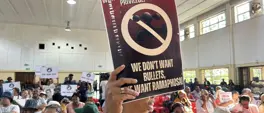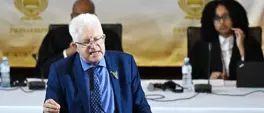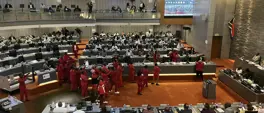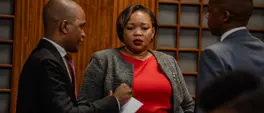MANDY WIENER: The tricky tightrope of plea deals for assassinations in SA
Mandy Wiener
24 August 2023 | 10:00The Hawks must now use what they have from striking a plea deal to ensure justice for Babita Deokaran.
OPINION
Hawks must now leverage whatever leads they have to ensure true justice is achieved.
Just one day before the second-year anniversary of her murder, six men pleaded guilty to the shooting of whistleblower and senior Gauteng Health Department official Babita Deokaran.
The six received sentences varying from six to 22 years behind bars.
The deal was reached as per Section 105a of the Criminal Procedure Act which means they are convicted and will now serve sentences. This is opposed to Section 204, which offers indemnity from prosecution in exchange for their testimony in court.
As a result of the plea deal, we now have more detail about the days leading up to Deokaran’s murder and the motive for why she was shot. She was followed for days and then assassinated because she was ‘causing problems’ at her place of work.
We only know because of the excellent work of investigative journalist Jeff Wicks at News24 that Babita had put the brakes on massive corruption and an extraction network targeting the Tembisa Hospital.
What we don’t know is who ordered the hit. The plea deal doesn’t help us there. There was a middleman who recruited the shooters, but we still don’t know who the kingpin was.
Judge Motsamai Makume accepted the plea but expressed concern about the fact that whoever was behind the murder had not been identified.
Deokaran’s brother Rakesh told News24 that while the proceedings “end a harrowing chapter in our life, we hope and believe there'll be another chapter where the mastermind will also be arrested”.
We have a long and difficult history in South Africa of plea deals with murderers and of course, there are pros and cons. In this case, it means that six men who executed a mother, a good civil servant, and a corruption fighter, are off the streets and have been incarcerated. It also means that the NPA will not have to run a lengthy and expensive criminal trial and the courts won’t be encumbered by yet another case. It frees up resources for another matter. It also notches up convictions for the NPA who are in dire need of a publicity boost post the state capture era.
However, the reality is some of the six may well be out of jail in a few years and have already served nearly two years in prison. It also must be noted that the men, who come from indigent backgrounds, have been represented by some of the most high-profile advocates in the country and that could not come at a cheap price.
If the six are lying and do in fact know who ordered the hit, they could have struck a deal to implicate the mastermind and testify in court in exchange for indemnity from prosecution or reduced sentences. Either they don’t know who it is, are too terrified that they will be killed if they spill or the NPA is simply not considering that as an option because of past experience.
The NPA famously offered mining tycoon Brett Kebble’s killers Section 204s, immunity from prosecution, in exchange for their testimony against Glenn Agliotti. This meant that they stood up in court, recounted in great detail how Kebble drove to his death and how he was executed, and the shooters could walk out of court and continue with their lives.
It was a strategy to leverage pressure on Agliotti so that he in turn could get a 204 to testify in the corruption case against former National Police Commissioner Jackie Selebi. The strategy worked in the sense that Selebi was convicted but the NPA and the Scorpions faced considerable backlash for cutting deals with criminals. It was one of the primary complaints used to dismantle the Scorpions and was the excuse used by former President Thabo Mbeki to suspend then National Director of Public Prosecutions Vusi Pikoli.
Plea deals have also been struck in other well-known hit cases such as that of Pretoria mother Chanelle Henning and that of former honeymoon murder accused Shrien Dewani. Many would argue that in both those cases, the masterminds have not been satisfactorily brought to book.
There are obvious redeeming features of plea bargains. More so when those who enter them can provide information and can testify in court against someone higher up on the food chain. It is always better to get the Don than the Button Men.
But there are pitfalls too.
There is a sense from the Deokaran family and from the broader public that justice has not entirely been served here. Two years later, it is evident that the Hawks and investigators are no closer to establishing the identity of the person who ordered the murder of Babita.
As Health Minister Joe Phaahla was quoted as saying, the six men should not “take their secret to the grave but disclose fully those who were involved".
"The plea bargain must never be the end of the case, we expect the criminal justice authorities to stop at nothing until the masterminds are brought to book," Phaahla said to News24.
We don’t know from the plea deal how much information the six have given to the investigators, but the Hawks must now leverage whatever leads they have to ensure true justice is achieved.
Get the whole picture 💡
Take a look at the topic timeline for all related articles.
Trending News
More in Opinion

18 February 2026 17:30
VUYANI PAMBO | Biko, Bonga, and the running waters of Gauteng: Towards a liberation theology for South Africa's 2026 Elections

13 February 2026 10:24
JAMIL F. KHAN | Crime is not the disease, it’s the inheritance

13 February 2026 04:28
MANDY WIENER | Ramaphosa meets the moment on water and crime, but lived experiences will be the measure












